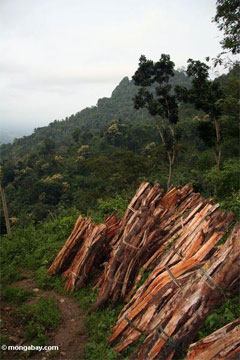Tsunami reconstruction drives illegal logging in Indonesia
Tsunami reconstruction drives illegal logging in Indonesia
mongabay.com
August 6, 2006
Tsunami reconstruction efforts are continuing to boost illegal logging and deforestation in Indonesia according to a new article published by the Associated Press.
Writer Michael Casey visited the Aceh province on the island of Sumatra. The region suffered the heaviest damage and loss of life from the December 2004 tsunami.
Casey writes that the recent peace agreement between Aceh rebels and the Indonesian government has hastened the destruction of the province’s biologically diverse tropical rainforests.
“Aceh was largely protected during a decades-long separatist insurgency, with logging primarily limited to rebels and rogue elements within the military,” writes Casey. “But last year’s peace deal opened up previously inaccessible virgin forests.”
 Wood harvest in Indonesia. Photo by Rhett A. Butler
|
Casey notes that aid groups are conflicted, “having to balance the need to build quickly against their duty to use legal timber.” Several groups have been caught using wood from illegal sources. In total, Aceh reconstruction efforts will require an estimated 1.4 million cubic feet of lumber.
Beyond providing timber for reconstruction, illegal logging is also providing work for local people. A 25-year-old local man told the Associated Press, “Everyone is getting into the logging business. People have no work, so selling the wood is a good way to make money.”
Commercial logging bas been officially banned in Aceh since 2001 but police corruption allows local loggers to transport wood.
Logging is also putting a pressure on forests outside Sumatra and conservation group WWF has warned that deforestation could result in a second ecological disaster.
Related articles
Tsunami relief, rainforest attack; aid groups conflict over deforestation and reconstruction In the Indonesian subdistrict of Lamno on the island of Sumatra, rapid reconstruction from the December tsunami’s swath of destruction is taking place by several intrepid private organizations. The Aceh province was hit the hardest out of all the areas affected by the tsunami. At first glance, this efficient and speedy rebuilding of homes, schools, churches and fishing boats seems like nothing but a reassuring progression into recovery. Upon closer inspection however, it is becoming clear that despite the good intention of the relief groups coordinating these efforts, the response to one tragic disaster may only be facilitating another. In this region on the west coast of the island, various aid organizations are using tropical hardwood timber that has been illegally harvested from nearby mountains to build structures for the local people. These individuals certainly need homes and livelihoods, which will be facilitated with the return of their fishing boats, but by using materials that negatively impact the local ecosystem on many levels, the stage for a new disaster is being set.
Saving Orangutans in Borneo The air is warm and heavy with the morning humidity typical of the Borneo rain forest as our kelotok, a traditional boat, motors up a river so black in color it could be mistaken for ink. The raucous calls of a pair of hornbills can be heard over the rumble of the engine as they fly overhead with their gaudy and over-sized beak adornments.
This article uses quotes from an AP article.